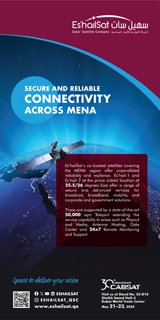African Space Industry Revenues to Surpass US$10.24 billion by 2024 Despite COVID-19 Setback
Lagos, Nigeria, July 14, 2021--A new report from Space in Africa projects that the Arican space industry revenues will surpass US$ 10.24 billion by 2024 despite setbacks from the COVID-19 pandemic. Highlights of the report includes:
- Africa's space budget for 2021 is USD 548.6 million, a 9% increase from 2020 and a 94% increase from the 2018 budget.
- 114 new satellites are currently under development by 20 countries, expected to be launched between now and 2025.
- Ten countries are now working on developing their first satellite, hoping to join the current list of 14 countries that have put a satellite in space.
- New opportunities in the launch segment have opened as foreign partners are beginning to capitalise on existing African launch sites; the East and the Horn of Africa are the leading destinations.
- Space technologies continue to be instrumental to Africa’s development, with an increasing number of space application projects being implemented across the continent.
As the leading analytics and consulting company focusing on the African space and satellite industry, Space in Africa has released the African Space Industry Annual Report, 2021 Edition. The report was built on the two previous editions to analyse space activities across the continent, industry dynamics, and trends, opportunities for government and commercial players, as well as the regulatory framework.
Increasing government budget
The African space industry has maintained positive growth despite the ongoing Covid-19 pandemic. From a budget of USD 283.12 million in 2018, government space budgets in Africa rose to USD 325.11 million in 2019 and USD 503.12 million in 2020, contributing 0.7% to global space budgets in 2020, the fourth highest region after North America, Europe, and Asia. In 2021, African countries budgeted USD 548.6 million for the space program, a 9% increase from the 2020 budget.
New players on the block
African governments have increasingly become aware of the potential and opportunities underlying the space sector, which is evident by the growing number of African countries developing national space programs. For example, Botswana launched a space program in December 2020, the Rwandan legislature approved the law establishing Rwanda Space Agency in March 2021, Namibia launched a National Space Science and Technology Policy in June 2021, and Burkina Faso, Djibouti, and Zambia are now developing new satellites that will launch their National space program.
Space for sustainable development
Through Agenda 2063: The Africa We Want, the African Union has identified space technologies as a critical tool that can boost Africa’s economic growth and development and lead to the rapid transformation of the continent. 81 space application projects are currently being implemented across the continent funded by African and foreign institutions. These projects are capitalising on earth observation resources and satellite communications to address various socio-economic problems across the continent, from disaster monitoring to security, agriculture, land use and management, forest management, among others.
Growing satellite market
Tunisia launched Challenge-One in March 2021, while Mauritius launched MIRSAT-1 in June 2021. These two satellites bring the number of African satellites launched to date to 44. At the same time, 125 satellites are now under development across 23 African countries, all expected to be launched before 2025. New opportunities have emerged around satellite constellations on the continent, with Egypt, South Africa, and Tunisia leading various initiatives. While Africa is currently unable to launch satellites from the continent, new opportunities are now emerging for foreign players to capitalise on several launch sites available on the continent. The industry made revenue of USD 7.37 billion in 2019 and is expected to generate over USD 10.24 billion in revenue by 2024, with growth across earth observation and geospatial services, satellite communications services, satellite navigations services, and component manufacturing and equipment services.
More commercial activities than ever before
Over 282 companies now operate in the industry value chain - both upstream and downstream companies. Their operations cut across component manufacturing and equipment services, earth observation and geospatial services, satellite communications services, astronomy services, among others. More companies were founded in the last decade, across the industry segment, than in the previous five decades. While most downstream companies are domiciled in Egypt, Kenya, Nigeria, and South Africa, the majority of the upstream companies are domiciled in South Africa.
The 2021 edition of the Africa Space Industry Annual Report is published by Space in Africa, the authority on news, data and market analysis for the African space and satellite industry. It presents data and analyses on projects, deals, partnerships, and investments across the continent. It also analyses the growing demand for space technologies and data on the continents, the business opportunities it offers and the necessary regulatory environment in the various countries.
The report comes with annual access to real-time data on every industry segment and player via the new Space in Africa Data Portal.
Visit www.spaceinafrica.com/reports to access the report.





